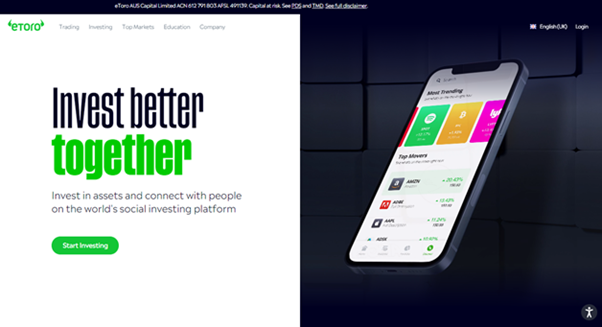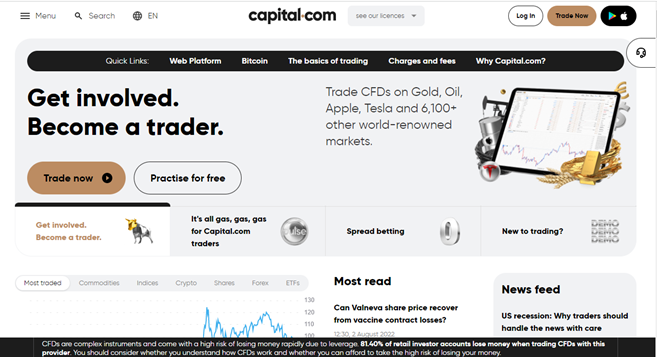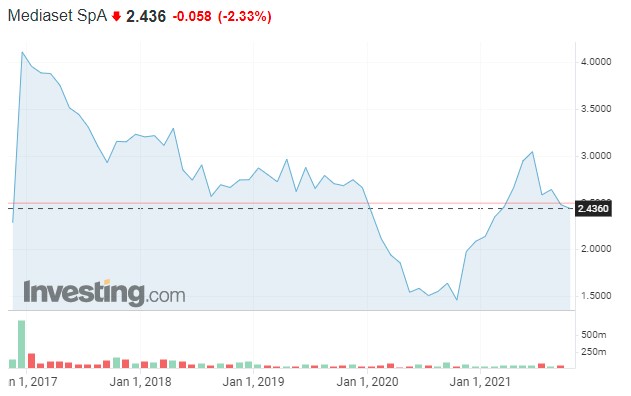How to buy Mediaset stocks in 2026

Mediaset S.p.A or Gruppo Mediaset is an Italian Group of mass-communication companies that operates many TV and radio channels, produces and streams free and paid content on various apps, and uses its operating media to sell advertisements.
The company has many subsidiaries, such as Mediaset Italia, an Italian media and content production company; Mediaset España, a Spanish media company; and ProsiebenSat.1, a company engaged in entertainment, dating, and commerce & ventures business. The group’s other subsidiaries include Mediaset RTI, RadioMediaset, Publitalia ‘80, and many others. The company is listed on the Milan Stock Exchange and BATS Europe in Italy, London Stock Exchange in the UK, Dusseldorf and Frankfurt stock exchanges in Germany.
The article explains how you can buy Mediaset stock, analyzes its fundamental metrics, and details important information about the company.
How to Buy GETVF Stocks in 5 Easy Steps
-
1Visit eToro through the link below and sign up by entering your details in the required fields.
-
2Provide all your personal data and fill out a basic questionnaire for informational purposes.
-
3Click 'Deposit', choose your favourite payment method and follow the instructions to fund your account.
-
4Search for your favourite stock and see the main stats. Once you're ready to invest, click on 'Trade'.
-
5Enter the amount you want to invest and configure your trade to buy the stock.
The Best 3 Brokers for Investing in Mediaset
1. eToro
eToro is a social trading and investment platform that allows users to trade a variety of assets, including cryptocurrencies. The platform is designed to be user-friendly and intuitive, making it a good choice for those new to investing. eToro also offers some features that can be useful for more experienced investors, such as the ability to copy other traders' portfolios. You can read our full eToro review here.

Security and Privacy
eToro takes security and privacy seriously, offering features such as 2-factor verification and encrypted passwords to keep user accounts safe. The platform also offers a strict anti-money laundering policy to protect users from fraud. To prevent abuse of the platform, they have put several security features in place, such as data loss prevention and restriction of access based on IP address. When a user invests, an additional security feature blocks the transaction from being executed if the account is linked to a potentially fraudulent user. In addition, they employ top vendors, web solutions, and firewalls, constantly on the alert to block a possible cyber-attack.
They take users’ privacy of utmost importance and never share their personal information without their consent.
Fees and Features
One of the most attractive features of eToro is that it is a multi-asset platform which gives access to over 2,000 financial assets like stocks, ETFs, indices, Cryptocurrencies and many more. eToro offers users Free Insurance that would cover claims in case of insolvency or an event of misconduct. Another feature that makes this platform one of the best around is the social trading feature. You can join a community of 20 million traders all around the world and connect with like-minds to shape your trading decisions. Lastly, the CopyTrader feature allows you to use the performance of some seasoned investors to know the one to replicate.
eToro offers 0% commission when you open a long, non-leveraged position on a stock or ETF with no management fees or deposit fees. However, the platform charges an inactivity fee of $10 per month if you don’t trade for 12 months. There is also a low fixed $5 fee for withdrawals.
| Fee Type | Fee Amount |
| Commission Fee | 0% |
| Deposit Fee | None |
| Withdrawal Fee | $5 |
| Inactivity Fee | $10 (monthly) |
Pros
- Security and Privacy
- Low fees and commission
- Copytrading
- Social trading
Cons
- High inactivity fee
- Limited customer service
2. Capital.com
Capital.com offers a variety of investment products and services to its clients. These include stocks, indices, commodities, shares, crypto, and forex. Capital.com has a wide range of clients, including retail investors, institutional investors, and high-net-worth individuals. You can read our full Capital.com review here.

Security and Privacy
Capital.com is licensed by several top regulatory bodies, including the FCA, CySEC, ASIC, and the FSA. This indicates that Capital.com customers are well safeguarded and that the platform adheres to strict guidelines to guarantee that consumer information is secure and hidden. In addition, Capital.com’s compliance with PCI Data Security Standards is another way it safeguards its customers’ information.
Every deposit made by retail customers is protected by the Investment Compensation fund according to regulatory guidelines.
Fees and Features
With CFD trading, customers have access to over 6,000 markets with tight spreads. Capital.com offers educational materials that can help customers to make more informed decisions. Another feature Capital.com offers is Spread betting. This gives customers access to speculate on upward and downward moves on over 3000 markets. The broker provides a tool powered by AI in its mobile trading app that offers individualized trading insights by utilizing a detection algorithm to uncover different cognitive biases.
Capital.com charges no fees on deposit, withdrawal, commission or inactivity.
| Fee Type | Fee Amount |
| Commission Fee | 0% |
| Deposit Fee | None |
| Withdrawal Fee | None |
| Inactivity Fee | None |
Pros
- Tight spreads
- 0% commission with no hidden charges
- Artificial Intelligence
- Risk management tools
- Educational materials
Cons
- Overnight fees
- Mostly restricted to CFDs
3. Skilling
Skilling is an online trading platform that offers users the ability to trade a variety of financial assets, including forex, CFDs, and cryptocurrencies. The platform is designed to be user-friendly and provides traders with all the tools and resources they need to start trading. Skilling also offers a demo account so that users can practice trading before they start trading with real money. You can read our full Skilling review here.
Security and Privacy
The security and privacy of the Skilling online trading platform are taken very seriously. All information entered into the platform is encrypted and stored securely. Only authorized personnel have access to this information. In addition, the platform uses two-factor authentication to ensure that only authorized users can access account information. Skilling is regulated by the Cyprus Securities and Exchange Commission (CySEC), which means customers can rest assured about the security of their assets.
Fees and Features
Skilling has four different platforms; Skilling Trader, Skilling cTrader, Skilling MetaTrader 4 and Skilling Copy. Skilling Trader is designed for traders on all levels with access to all the tools needed for trading analysis. Skilling cTrader on the other hand is designed for advanced traders with a focus on order execution and charting capabilities. MetaTrader 4 is a forex and CFDs trading platform with a very versatile and easy-to-customise interface. Skilling Copy is a copy trading platform which allows members to have access to follow or copy trading strategies of seasoned traders at a fee.
Skilling does not charge any fee for inactivity, deposit or withdrawal. However, there are commission charges on FX pairs and Spot Metals on the Premium account type. These charges start from $30 per million USD traded.
| Fee Type | Fee Amount |
| Commission Fee | Varies |
| Deposit Fee | None |
| Withdrawal Fee | None |
| Inactivity Fee | None |
Pros
- Reliable 24/5 customer support
- Over 1000 trading instruments
- Superb licensing and regulation
- Demo account
Cons
- Not enough educational materials
- High Spreads
- Service is unavailable in many countries including the US and Canada.
Everything You Need To Know About Mediaset
Gathering vital information about the company allows you to understand the risks and potential drivers of stock, enabling you to make better investment decisions. The following sections discuss Mediaset’s history, strategy, revenue sources, and the stock’s recent performance.
Mediaset History
Mediaset was founded by Italian politician Silvio Berlusconi in 1993 in Milan, Italy. In 1996, the company got listed on the Milan Stock Exchange. In 1997, the company bought a 25% stake in a Spanish broadcaster Telecino. The Group launched its web portal under the name Mediaset.it that streamed three general channels (Canale 5, Retequattro, and Italia 1) and an online newspaper Mediaset Online. Mediaset increased its stake to 50.1% in Telecinco in 2003, and in the next year, the acquired company was listed on the Madrid Stock Exchange. In 2004, the company launched a kids channel Boing and a teleshopping channel Mediashopping.
In 2007, the company acquired Medusa, an Italian film production company. In 2010, it launched women content channel La5, internal information agency NewsMediaset, and an online catch-up TV video.mediaset.it. The group launched its first Italian over-the-top (OTT ) service in 2013 that allowed users to stream a catalogue of over 6,000 productions.
The group made a new acquisition of Retecapri, a free radio channel in 2017. During the year, the company also made new equity investments and increased its stake in some businesses. In 2018, the company launched Mediaset Play, which is an online platform that allows viewers to watch live and on-demand content of Mediaset TV on all devices.
What Is Mediaset’s Strategy?
Mediaset’s strategy is focused on increasing growth in revenues from three business areas: TV, radio, and digital. The company implemented a cross-media approach for advertising that enables it to target prospects through age and gender, allows localization of advertisements, and analyzes interests, viewing/listening behaviours, and purchase intent of the target customers.
The company’s content strategy focuses on “own and local production” and international monetization of its most popular productions. Also, the company aims to produce data-driven content and focuses on digital mediums by efficiently managing its digital content space.
The company’s management strives to transform its business model into a tech-enabled model and adopt a simplified but optimized organizational structure. It focuses on further improving its critical processes of production, logistics, and sourcing by including technology and optimizing its broadcasting capabilities.
How Does Mediaset Make Money?
Mediaset earns money from advertising. The linear-digital media (TV, radio, digital audio, CTV, and DGT) generates 75%, while linear TV and linear media generate 18% and 7% of the company’s total revenue, respectively.
How Has Mediaset Performed in Recent Years?
Mediaset SpA stock briefly climbed past the €4.00 level in December 2016 but quickly started receding until it hit its 5-year low of €1.40 in October 2020. The stock has recovered from its lows to its current price of €2.43. Over the previous five years (October 2016 and October 2021), the stock generated a negative return of 2.3%.

Source: Investing.com
Where Can You Buy Mediaset Stock?
You can buy Mediaset stock if you have an account with a stockbroker. Brokers offer different types of accounts, such as cash account, leveraged or margin account, CFD account, and specialized investment accounts. Some brokers offer three versions of accounts - basic, advanced, and premium. The basic account provides basic functionalities while the advanced and premium accounts provide additional services, usually at a higher cost. For beginners, the basic account serves the purpose while advanced traders can opt for the advanced or premium account. You can check the website of brokers to determine the types of accounts they offer.
Mediaset Fundamental Analysis
Fundamental analysis allows investors to find out the stock’s intrinsic or fair value in comparison to its current market price. Investors use the company’s financial statements and the stock’s market price to calculate various financial metrics to facilitate their investment decision. The most commonly used fundamental metrics investors use include revenue, earnings per share, P/E or price-to-earnings ratio, dividend yield, and free cash flow.
Mediaset’s Revenue
Revenue determines the sale value of products or services a company sold in a period. Revenue is also called top-line as it is the first item on the income statement issued by the company. Investors search for companies that exhibit consistent growth in revenue as it reflects the viability of the company’s business model, expansion of market share, and the trust of customers in its products or services.
Mediaset reported revenue of €1.38 billion in the first half of 2021.
Mediaset’s Earnings-per-Share
Earnings per share or EPS of a company denotes the net profit or earnings available for each share of common stock outstanding. The basic EPS is calculated by first deducting preferred stock dividends if any from the net profit and dividing the result by the average number of common stock shares outstanding. The other version of the metric, diluted EPS, differs from the basic one in the calculation of the average number of common stock shares outstanding - it also includes the convertible securities, such as convertible preferred stocks and convertible bonds in the common stock, which dilutes the result.
Like earnings growth, growth in EPS is also considered a positive sign, and companies that report a consistent rise in EPS are preferred by investors. As of October 14, 2021, Mediaset’s trailing 12-month EPS stood at €0.3380.
Mediaset’s P/E Ratio
The price to earnings or P/E ratio determines the multiples at which a stock is trading compared to its earnings per share or EPS. It is calculated by dividing the stock’s market price by its EPS. For example, if a stock is trading at $100 while its EPS is $10, its P/E ratio would be 10x. This means that the stock is trading at 10 times its earnings per share.
The P/E ratio is reported on a trailing 12-month basis, which means that the EPS of the previous 12 months are taken into account while calculating the ratio. As of October 14, 2021, the stock’s TTM P/E ratio was 7.29x.
Mediaset’s Dividend Yield
Dividends represent cash distributions a company made to its shareholders from its profits. It is the prerogative of the board of directors to declare dividends as and when they deem fit keeping in view the company’s dividend policy and the state of business, among other factors. To be eligible to get the dividends announced by the company, an investor must hold the share before the ex-dividend date.
Dividend yield, on the other hand, represents the amount of annual dividends per share - expressed as a percentage of the stock’s market price. It is calculated by dividing the annual dividends per share by the stock’s current market price and multiplying the result by 100 to determine the percentage. For example, a stock that paid $10 per share annually as dividends while its current stock price is $100, its dividend yield would be 10% ($10/$100)x100.
As of October 14, 2021, the stock’s trailing annual dividend yield was 0.82%.
Mediaset’s Cash Flow
Free cash flow is calculated by deducting capital expenditures from the company’s operating cash flows. The operating cash flows can be viewed on a company’s cash flow statement. Positive and large figures of free cash flows depict that the company is in a good financial state, is generating healthy cash flows from its operations, and the cash is sufficient to fund its capital expenditures as well as dividends and interest payments.
The cash and cash equivalents figure shows the amount of cash a company is holding at the time of the preparation of the cash flow statement. The company reported a free cash flow of €133.3 million in 1H2021.
Why Buy Mediaset Stocks?
Mediaset is a large group of media companies with operations in Italy and Spain. The company is active in the mass-media industry and has a wide range of TV, radio, digital, and streaming channels. There are numerous reasons why you should buy Mediaset stocks:
- The company has plenty of mass-media channels, which makes it an ideal platform for advertisers to target their prospective customers.
- The company periodically pays dividends as well, so investors have a chance to get capital gains as well as potential dividends.
- The company generated healthy revenues in H1 2021 compared to the previous year, while earnings from Italy and Spain operations also rose significantly from €31.7 in 1H 2020 to €198.7 in 1H2021.
Expert Tip on Buying Mediaset Stock
“ Mediaset stock remained flat and returned marginally negative returns if you held the stock for the previous five years. On the other hand, investors who held the stock since the start of 2021 have earned around 16% return till the time of the writing. This shows that you should follow the short-term firm-specific developments to buy and sell the stock at the right times. You can also use the short-term market triggers or technical analysis levels to trade the stock profitably. ”
5 Things to Consider Before You Buy Mediaset Stock
Expert investors strictly follow time-tested techniques before considering any investment proposal. Your trading or investing performance can significantly improve if you follow these expert tips.
1. Understand the Company
Famous investors like Warren Buffett and Peter Lynch spend considerable time researching the company before buying its stock. The research process involves understanding the company’s business, revenue sources, conducting fundamental analysis, studying financial statements, scanning its competitive environment, and determining risks and weaknesses. Doing your research before investing in a company’s stock will allow you to make correct decisions and help you buy and sell the stock at the right time to maximize your returns.
2. Understand the Basics of Investing
Understanding and employing the basic principles of investing is essential not only for beginners but for expert investors as well. One of the fundamental concepts of investing is to employ risk management techniques, which will help you generate higher returns per unit of risk taken. If you are into long-term investing, you should create a diversified portfolio of stocks instead of investing all your money in a single stock. On the other hand, if you are into short-term trading, you can employ risk management strategies by placing stop orders in each of your trades.
3. Carefully Choose Your Broker
Selecting the right broker can make a difference in your trading and investing performance. While there are hundreds of brokers available on the market - each claiming to offer unique and distinguishing services - you should look out for the following essential features in a broker. Your broker should:
- Allow you access to an advanced trading terminal that can be used across all operating systems and devices, including smartphones.
- Be regulated by a local regulator.
- Charge low trading fees, commissions, and spreads.
- Give you access to trade a vast number of financial instruments.
- Provide easy and popular deposit and withdrawal methods.
- Provide access to demo accounts where you can test your trading strategies and make yourself familiar with the trading platform.
4. Decide How Much You Want to Invest
If you find a lucrative investment opportunity, you can consider allocating a larger portion of your money to that asset instead of putting all your money into a single investment. The key is to create a portfolio of stocks to reduce your overall investment risk. Similarly, if you are into short-term trading, you should calculate your trade size beforehand so that a small movement in the stock’s price against you does not wipe away your account. Expert traders only risk 1% to 2% of their trading accounts on a single trade and take only those trades that have the risk to reward ratio of greater than 2.
5. Decide on a Goal for Your Investment
Investment goal allows you to craft your investment strategy accordingly. An investment goal should be set realistically as the degree of risk you take directly depends on the return you want to achieve. A high-return goal is harder to achieve and requires investment in riskier investment avenues, which can put your capital at risk. A moderate investment goal can be relatively easily achieved by investing in comparatively safer assets.
The Bottom Line on Buying Mediaset Stocks
Mediaset Group reported a healthy increase in revenues and profit in its 1H2021 result. The company’s management has a positive earnings guidance for the rest of the year and has adopted an aggressive strategy to develop its business and increase its revenues.
If you want to buy Mediaset stock, you need to open an equity or trading account with a broker. You can open an account with a stockbroker online by signing up on the broker’s website, filling out an online form, and uploading the necessary documents, such as proof of residence and proof of identity or your ID card. Your broker will open your account subject to the successful verification of your documents. After your account is created, you can fund your account using any of the popular deposit methods.
If you want to explore more interesting stocks, you can browse our website as we have covered hundreds of stocks, providing in-depth information and fundamental analysis that can facilitate you in your investment decision.
Frequently Asked Questions
-
Mediaset stock trades on the Milan and BATS Europe in Italy, London Stock Exchange in the UK, Dusseldorf and Frankfurt stock exchanges in Germany.
-
The company faces competition from other media companies, including social media giants that have high engagement rates and a high number of users. So, advertisers look for other cheaper options as well, which can put the company’s advertising revenues under pressure.
-
Mediaset has, over the years, provided its shareholders with intermittent dividends, but you can’t predict with certainty whether the company would pay out any dividends. The board of directors analyze the financial position and future projects of the company to determine whether dividend payments are feasible or not.
-
To determine whether Mediaset stock is overvalued or undervalued, you need to analyze various fundamental metrics and compare the metrics with its peers. Sometimes few fundamental metrics give conflicting results, in which case you need to look for other metrics to get a clearer picture.
-
It depends on your investment horizon, risk appetite, and your investment objective. You should always look out for triggers that can influence the stock’s price so that you do not end up getting negative returns even holding it for, say, 5 years.
-
You should follow company- and industry-specific developments to trade Mediaset stocks. The stock can also be influenced by the general market sentiment and can move in tandem with the broader market index. In the absence of any triggers, a stock usually follows important technical levels and can be traded profitably using technical analysis.






